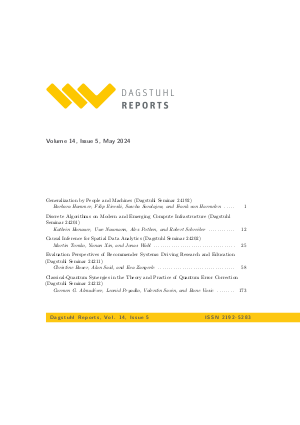Dagstuhl Reports, Volume 14, Issue 5
-
Part of:
Volume:
Dagstuhl Reports, Volume 14
Journal: Dagstuhl Reports (DagRep)

Event
- Dagstuhl Seminars 24192, 24201, 24202, 24211, 24212
Publication Details
- published at: 2024-11-26
- Publisher: Schloss Dagstuhl – Leibniz-Zentrum für Informatik
Access Numbers
- Detailed Access Statistics available here
-
Total Document Accesses (updated on a weekly basis):
0PDF Downloads
Documents
Dagstuhl Reports, Volume 14, Issue 5, May 2024, Complete Issue
Abstract
Cite as
Dagstuhl Reports, Volume 14, Issue 5, pp. 1-192, Schloss Dagstuhl – Leibniz-Zentrum für Informatik (2024)
Copy BibTex To Clipboard
@Article{DagRep.14.5,
title = {{Dagstuhl Reports, Volume 14, Issue 5, May 2024, Complete Issue}},
pages = {1--192},
journal = {Dagstuhl Reports},
ISSN = {2192-5283},
year = {2024},
volume = {14},
number = {5},
publisher = {Schloss Dagstuhl -- Leibniz-Zentrum f{\"u}r Informatik},
address = {Dagstuhl, Germany},
URL = {https://drops.dagstuhl.de/entities/document/10.4230/DagRep.14.5},
URN = {urn:nbn:de:0030-drops-222699},
doi = {10.4230/DagRep.14.5},
annote = {Keywords: Dagstuhl Reports, Volume 14, Issue 5, May 2024, Complete Issue}
}
Dagstuhl Reports, Table of Contents, Volume 14, Issue 5, 2024
Abstract
Cite as
Dagstuhl Reports, Volume 14, Issue 5, pp. i-ii, Schloss Dagstuhl – Leibniz-Zentrum für Informatik (2024)
Copy BibTex To Clipboard
@Article{DagRep.14.5.i,
title = {{Dagstuhl Reports, Table of Contents, Volume 14, Issue 5, 2024}},
pages = {i--ii},
journal = {Dagstuhl Reports},
ISSN = {2192-5283},
year = {2024},
volume = {14},
number = {5},
publisher = {Schloss Dagstuhl -- Leibniz-Zentrum f{\"u}r Informatik},
address = {Dagstuhl, Germany},
URL = {https://drops.dagstuhl.de/entities/document/10.4230/DagRep.14.5.i},
URN = {urn:nbn:de:0030-drops-222630},
doi = {10.4230/DagRep.14.5.i},
annote = {Keywords: Table of Contents, Frontmatter}
}
Generalization by People and Machines (Dagstuhl Seminar 24192)
Abstract
Cite as
Barbara Hammer, Filip Ilievski, Sascha Saralajew, and Frank van Harmelen. Generalization by People and Machines (Dagstuhl Seminar 24192). In Dagstuhl Reports, Volume 14, Issue 5, pp. 1-11, Schloss Dagstuhl – Leibniz-Zentrum für Informatik (2024)
Copy BibTex To Clipboard
@Article{hammer_et_al:DagRep.14.5.1,
author = {Hammer, Barbara and Ilievski, Filip and Saralajew, Sascha and van Harmelen, Frank},
title = {{Generalization by People and Machines (Dagstuhl Seminar 24192)}},
pages = {1--11},
journal = {Dagstuhl Reports},
ISSN = {2192-5283},
year = {2024},
volume = {14},
number = {5},
editor = {Hammer, Barbara and Ilievski, Filip and Saralajew, Sascha and van Harmelen, Frank},
publisher = {Schloss Dagstuhl -- Leibniz-Zentrum f{\"u}r Informatik},
address = {Dagstuhl, Germany},
URL = {https://drops.dagstuhl.de/entities/document/10.4230/DagRep.14.5.1},
URN = {urn:nbn:de:0030-drops-222682},
doi = {10.4230/DagRep.14.5.1},
annote = {Keywords: Abstraction, Cognitive Science, Generalization, Human-AI Teaming, Interpretable Machine Learning, Neuro-Symbolic AI}
}
Discrete Algorithms on Modern and Emerging Compute Infrastructure (Dagstuhl Seminar 24201)
Abstract
Cite as
Kathrin Hanauer, Uwe Naumann, Alex Pothen, and Robert Schreiber. Discrete Algorithms on Modern and Emerging Compute Infrastructure (Dagstuhl Seminar 24201). In Dagstuhl Reports, Volume 14, Issue 5, pp. 12-24, Schloss Dagstuhl – Leibniz-Zentrum für Informatik (2024)
Copy BibTex To Clipboard
@Article{hanauer_et_al:DagRep.14.5.12,
author = {Hanauer, Kathrin and Naumann, Uwe and Pothen, Alex and Schreiber, Robert},
title = {{Discrete Algorithms on Modern and Emerging Compute Infrastructure (Dagstuhl Seminar 24201)}},
pages = {12--24},
journal = {Dagstuhl Reports},
ISSN = {2192-5283},
year = {2024},
volume = {14},
number = {5},
editor = {Hanauer, Kathrin and Naumann, Uwe and Pothen, Alex and Schreiber, Robert},
publisher = {Schloss Dagstuhl -- Leibniz-Zentrum f{\"u}r Informatik},
address = {Dagstuhl, Germany},
URL = {https://drops.dagstuhl.de/entities/document/10.4230/DagRep.14.5.12},
URN = {urn:nbn:de:0030-drops-222672},
doi = {10.4230/DagRep.14.5.12},
annote = {Keywords: Combinatorial Scientific Computing, Discrete Algorithms, Graph Algorithms, High-Performance Computing}
}
Causal Inference for Spatial Data Analytics (Dagstuhl Seminar 24202)
Abstract
Cite as
Martin Tomko, Yanan Xin, and Jonas Wahl. Causal Inference for Spatial Data Analytics (Dagstuhl Seminar 24202). In Dagstuhl Reports, Volume 14, Issue 5, pp. 25-57, Schloss Dagstuhl – Leibniz-Zentrum für Informatik (2024)
Copy BibTex To Clipboard
@Article{tomko_et_al:DagRep.14.5.25,
author = {Tomko, Martin and Xin, Yanan and Wahl, Jonas},
title = {{Causal Inference for Spatial Data Analytics (Dagstuhl Seminar 24202)}},
pages = {25--57},
journal = {Dagstuhl Reports},
ISSN = {2192-5283},
year = {2024},
volume = {14},
number = {5},
editor = {Tomko, Martin and Xin, Yanan and Wahl, Jonas},
publisher = {Schloss Dagstuhl -- Leibniz-Zentrum f{\"u}r Informatik},
address = {Dagstuhl, Germany},
URL = {https://drops.dagstuhl.de/entities/document/10.4230/DagRep.14.5.25},
URN = {urn:nbn:de:0030-drops-222668},
doi = {10.4230/DagRep.14.5.25},
annote = {Keywords: Spatial Causal Analysis, Spatial Causal Inference, Spatial Causal Discovery, Spatial Analysis, Spatial Data, Dagstuhl Seminar}
}
Evaluation Perspectives of Recommender Systems: Driving Research and Education (Dagstuhl Seminar 24211)
Abstract
Cite as
Christine Bauer, Alan Said, and Eva Zangerle. Evaluation Perspectives of Recommender Systems: Driving Research and Education (Dagstuhl Seminar 24211). In Dagstuhl Reports, Volume 14, Issue 5, pp. 58-172, Schloss Dagstuhl – Leibniz-Zentrum für Informatik (2024)
Copy BibTex To Clipboard
@Article{bauer_et_al:DagRep.14.5.58,
author = {Bauer, Christine and Said, Alan and Zangerle, Eva},
title = {{Evaluation Perspectives of Recommender Systems: Driving Research and Education (Dagstuhl Seminar 24211)}},
pages = {58--172},
journal = {Dagstuhl Reports},
ISSN = {2192-5283},
year = {2024},
volume = {14},
number = {5},
editor = {Bauer, Christine and Said, Alan and Zangerle, Eva},
publisher = {Schloss Dagstuhl -- Leibniz-Zentrum f{\"u}r Informatik},
address = {Dagstuhl, Germany},
URL = {https://drops.dagstuhl.de/entities/document/10.4230/DagRep.14.5.58},
URN = {urn:nbn:de:0030-drops-222655},
doi = {10.4230/DagRep.14.5.58},
annote = {Keywords: Recommender Systems, Evaluation, Information Retrieval, User Interaction, Intelligent Systems}
}
Classical-Quantum Synergies in the Theory and Practice of Quantum Error Correction (Dagstuhl Seminar 24212)
Abstract
Cite as
Carmen G. Almudéver, Leonid Pryadko, Valentin Savin, and Bane Vasic. Classical-Quantum Synergies in the Theory and Practice of Quantum Error Correction (Dagstuhl Seminar 24212). In Dagstuhl Reports, Volume 14, Issue 5, pp. 173-190, Schloss Dagstuhl – Leibniz-Zentrum für Informatik (2024)
Copy BibTex To Clipboard
@Article{almudever_et_al:DagRep.14.5.173,
author = {Almud\'{e}ver, Carmen G. and Pryadko, Leonid and Savin, Valentin and Vasic, Bane},
title = {{Classical-Quantum Synergies in the Theory and Practice of Quantum Error Correction (Dagstuhl Seminar 24212)}},
pages = {173--190},
journal = {Dagstuhl Reports},
ISSN = {2192-5283},
year = {2024},
volume = {14},
number = {5},
editor = {Almud\'{e}ver, Carmen G. and Pryadko, Leonid and Savin, Valentin and Vasic, Bane},
publisher = {Schloss Dagstuhl -- Leibniz-Zentrum f{\"u}r Informatik},
address = {Dagstuhl, Germany},
URL = {https://drops.dagstuhl.de/entities/document/10.4230/DagRep.14.5.173},
URN = {urn:nbn:de:0030-drops-222647},
doi = {10.4230/DagRep.14.5.173},
annote = {Keywords: Fault-tolerant quantum computing, Quantum computing architectures, Quantum error correction, quantum information, Quantum LDPC codes}
}